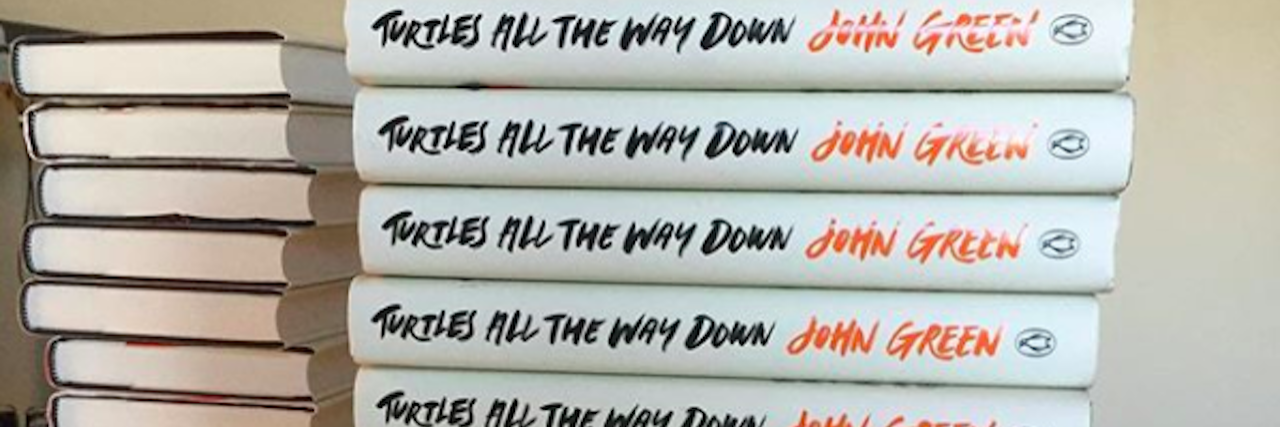How 'Turtles All the Way Down' Actualized My Deepest Fear as a Depressed Person
Warning: Spoilers ahead. If you haven’t read “Turtles All the Way Down” by John Green, save this article for later.
One of the biggest lies my depression tells me is that I’m a burden. No one wants to be around me when I’m spiraling further down into despair. No one cares about my sadness or numbness. So I isolate myself, fearing that if I ask for help or want to spend time with people, I’ll be a burden to them.
My heart knows the opposite of this is true, but my brain doesn’t. And in a scene from “Turtles All the Way Down,” I see this fear realized through the eyes of Aza, Green’s main character who struggles with obsessive-compulsive disorder (OCD).
In one particular scene, Aza is reading fan fiction written by her best friend Daisy, a sassy, determined girl who is obsessed with Star Wars.
As she’s reading Daisy’s latest Star Wars based fan fiction, Aza becomes keenly aware of something: one of the characters in the fan fiction, Ayala, is based on her. And Ayala isn’t the best character in the story — far from it.
Daisy describes Ayala as “my best friend and greatest burden.” The story depicts Ayala as an obsessive, worrisome and unwanted person in Rey and Wookie’s life, always messing up their plans and getting in the way with her uncertainty.
“I rolled my eyes. Ayala couldn’t get anything right. And the more she worried, the worse she made everything.”
“Ayala’s morals were all convenience because easy living was the only kind of living she’d ever known.”
Daisy even incorporated Aza’s OCD-induced ritualism into the story, when she points out that she pulls strands of hair out and twirls them on her fingers as a nervous habit, “though all her habits were nervous.”
It was also at this point that Green made a subtle switch in the language of the story — instead of Aza referring to Ayala as just a character in the story, she referred to Ayala as “I” — confirming that Daisy’s Ayala was based off Aza.
“The only time I’d ever done anything worthwhile was when, overcome by anxiety, I threw up on a Hutt named Yantuh, creating a momentary distraction that allowed Chewie to grab a blaster and save us from certain death.”
Notice the distinction? Aza knows she’s Ayala at this point. Despite Daisy being her best friend for many years, Aza realized that this is how she saw her: a burden, a nag, a worrier. Someone that hurt more than she helped.
It was here in the chapter where Aza breaks my heart. Because she starts to believe the words Daisy wrote in those stories about her.
“I woke up the next morning feeling wretched — not just tired, but terrified. I now saw myself as Daisy saw me — clueless, helpless, useless. Less.”
I read that last line and cried. No longer did Aza see any of her good qualities in their friendship; she now sees herself as the unwanted tag-along friend Daisy keeps around for writing fodder.
What Aza experienced here is my greatest fear as someone living with mental illness: that I’m a burden to the people around me, that I’m seen as less than because of my struggles. I’m scared that I’m someone that isn’t worth being around, that me and my illnesses are a barrier to true friendship and community. I’m scared that I’ll find out people say things about me like Daisy said about Aza behind closed doors, and that people are just my friend out of pity.
Every time someone doesn’t text back or doesn’t reach out to talk to me, I worry. What did I do to hurt/upset them?
Every time I say “I love you” and don’t get it back, I feel sad. Why don’t people love me like I love them?
Every time plans are canceled, I freak out. They don’t like me and don’t want to spend time with me.
Every time I’m super thoughtful toward a person and they don’t even respond, I get upset. I’m just not worth being seen or noticed, am I?
The list goes on.
I’ve always worried about what people think, but dealing with mental illness has taken that struggle to a whole new level.
I’m always afraid the people around me actually believe these things — that I’m a burden, useless, helpless, or a bother. Aza lived it. She saw my fear come to life in her best friend’s stories.
And Aza’s reaction is the thing that hurt me the worst: she believed it. Depression has made me believe these things too, and I’m scared I’d believe them if a friend said them about me too.
I’m forever grateful to John Green for this scene in the book. Even though reading it hurt — it hurt to see that pain and sadness Aza was feeling, but it also helped me to see that I wasn’t the only one with those feelings and worries swirling around in their head. I just hate that Aza had to have my fear actually realized in her life.
Seeing this play out in “Turtles All the Way Down” made me realize that I’m not alone in my fears. And I’m not alone in believing them, either.
We want to hear your story. Become a Mighty contributor here.
Lead image via John Green’s Instagram

